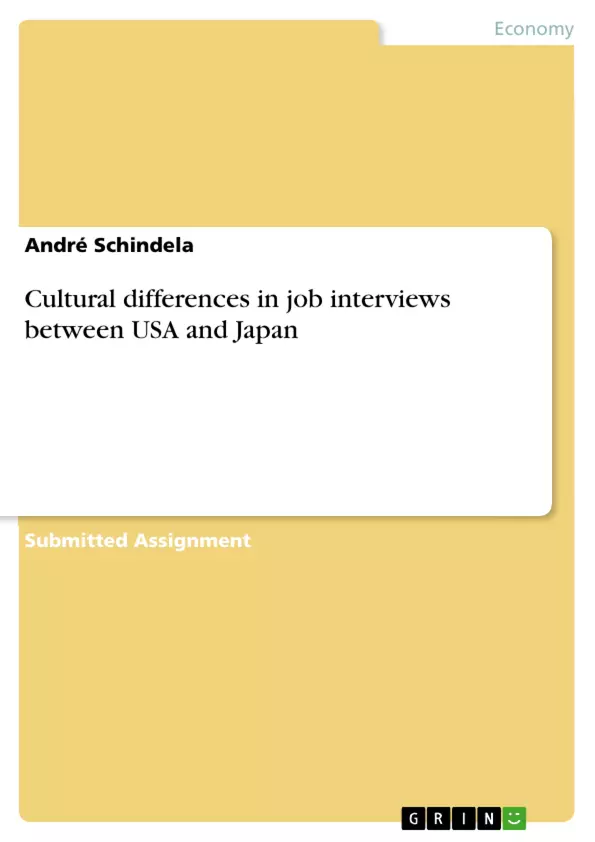This paper describes the practice of job interviews from the perspective of the interviewer and the interviewee. It researched how this business practice differs across USA and Japan. The author describes the kinds of interviews that these 2 cultures tend to prefer and compare how the cultures differ from Germany.
Inhaltsverzeichnis (Table of Contents)
- Cultural differences in job Interviews
- Culture types: Japanese culture
- Job interviewing in the Japanese culture
- Culture of the USA
- Job interview in the culture of the USA
- German culture
- Job interviews in the German culture
- Similarities and differences between the mentioned interviews
Zielsetzung und Themenschwerpunkte (Objectives and Key Themes)
The paper explores how various cultural aspects influence the interview process and candidate evaluation. It aims to provide a comprehensive analysis of cultural differences in job interviews, highlighting the impact of cultural norms, communication styles, and expectations on the interview experience.
- Cultural Norms and Communication Styles
- The Influence of Cultural Context on Interviewing Practices
- Cross-Cultural Communication Challenges in Job Interviews
- Cultural Dimensions and Their Impact on Candidate Evaluation
- Cultural Sensitivity and Intercultural Communication Skills in Job Interviews
Zusammenfassung der Kapitel (Chapter Summaries)
- The paper begins by discussing the importance of finding the right combination of skills and team fit for a company's success. It emphasizes the significance of cultural differences in the interview process, defining culture as a system of shared knowledge.
- The paper then focuses on Japanese culture, highlighting its high-context nature, emphasis on collectivism, and focus on building strong relationships. It explains how these cultural traits influence communication styles and the structure of job interviews.
- In the chapter on the U.S. culture, the paper emphasizes its low-context nature, valuing independence and individuality. It details how these cultural characteristics impact business communication and job interviewing practices, including the importance of self-promotion and a future-oriented approach.
- The paper examines German culture as a low-context culture, highlighting its focus on structure, punctuality, and direct communication. It explores how these values shape job interviewing practices, including the emphasis on a well-planned career path and clear communication.
- The paper compares and contrasts the interview practices of Japanese, American, and German cultures, emphasizing the differences in communication styles, teamwork dynamics, and levels of formality.
Schlüsselwörter (Keywords)
This paper focuses on the key concepts of culture, communication styles, intercultural communication, job interviews, cross-cultural differences, and candidate evaluation. It examines the impact of cultural dimensions, such as individualism versus collectivism, high-context versus low-context cultures, and direct versus indirect communication, on interview practices and candidate assessment.
Frequently Asked Questions
What are the main cultural differences in job interviews between the USA and Japan?
The USA is a low-context culture focusing on individuality and self-promotion, while Japan is a high-context culture emphasizing collectivism, harmony, and group fit.
How does the interview structure differ in Japanese culture?
Japanese interviews often focus more on building relationships and assessing how well a candidate fits into the company's collective spirit rather than just individual skills.
What is expected during a job interview in the USA?
Candidates are expected to be direct, highlight their personal achievements, and demonstrate a future-oriented, independent mindset.
How does German interview culture compare to the US and Japan?
German culture is low-context and values punctuality, structure, and direct communication, focusing heavily on a well-planned and documented career path.
What challenges arise in cross-cultural job interviews?
Misunderstandings often occur due to different communication styles (direct vs. indirect) and differing expectations regarding formality and team dynamics.
- Quote paper
- André Schindela (Author), 2018, Cultural differences in job interviews between USA and Japan, Munich, GRIN Verlag, https://www.grin.com/document/488826



